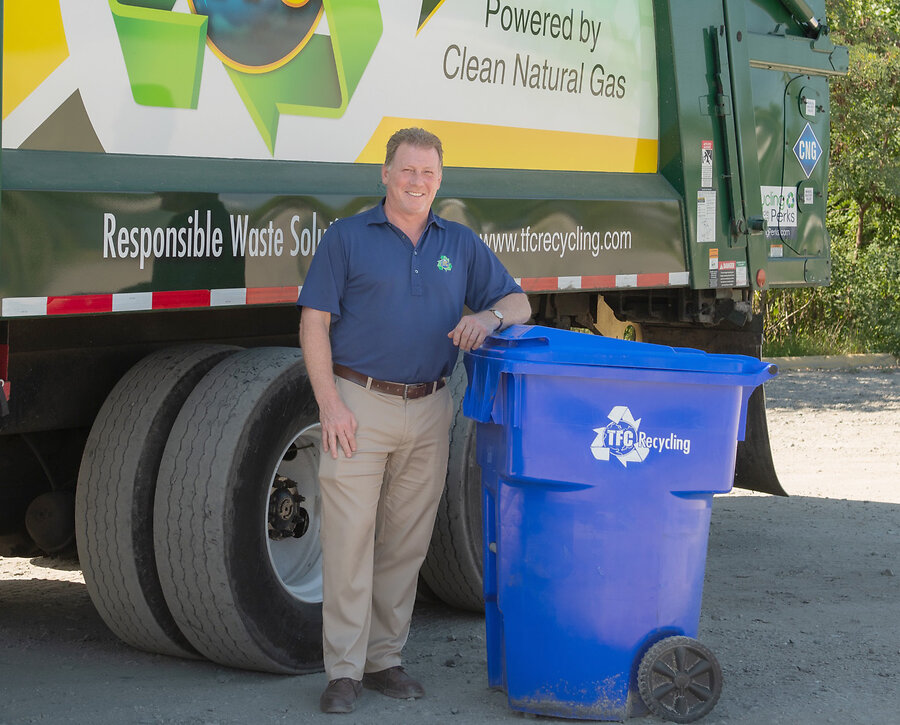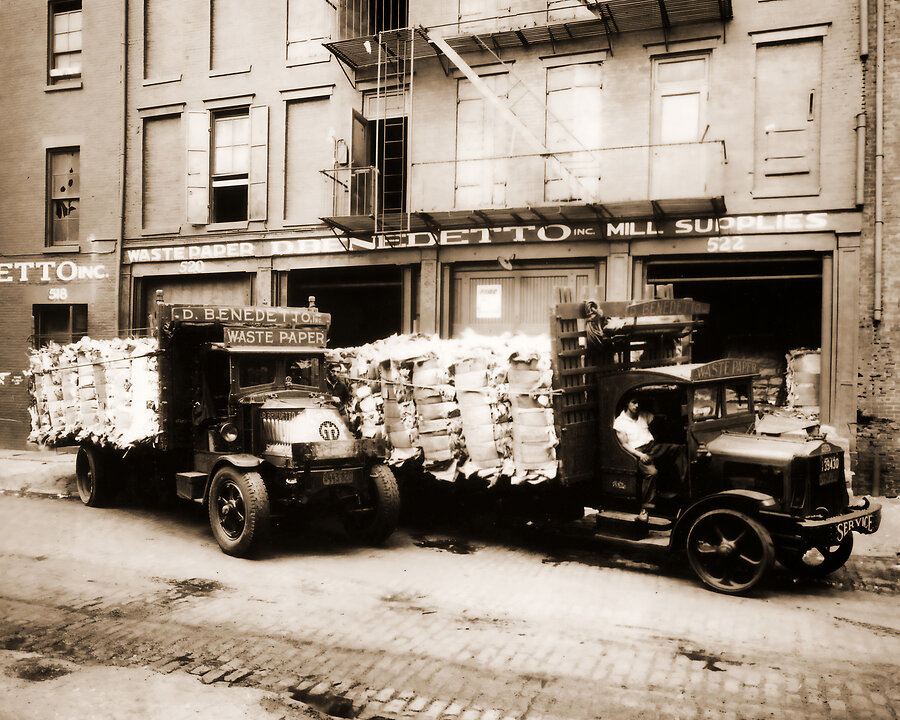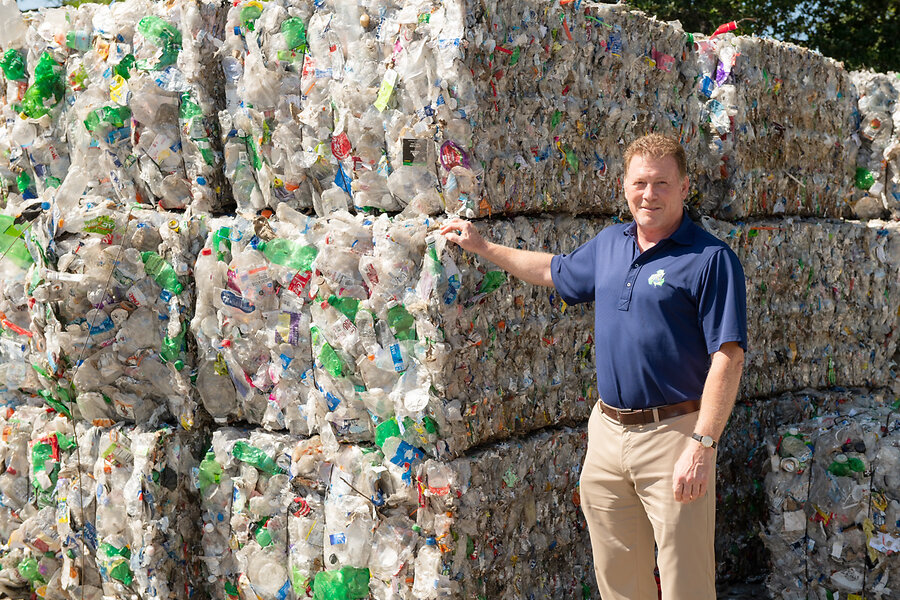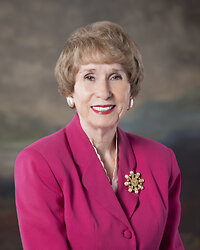TFC RECYCLING
From humble beginnings, this Chesapeake-based, family-owned business is now the largest recycler in Virginia
by Rob Lauer

Michael Benedetto, president and owner of TFC Recycling
Michael Benedetto has fond memories of spending summers in Virginia Beach as a teenager during the late 1970s and early 1980s.
"I'm originally from New York," he explains. "But as soon as school ended each year, my parents, three siblings, and I came down to a small condo in Virginia Beach, and we didn't head back to New York until school started in early September."
When Michael recalls those summers, one doesn't hear about sand, surf, and lazy afternoons spent sunbathing or catching a wave. Instead, Michael and his siblings spent those summers working outside at the materials recovery facility for their family's business, TFC Recycling, located in Chesapeake.
Founded in 1973, Tidewater Fibre Corp (now referred to as TFC Recycling) is now Virginia's largest residential curbside recycler. Through partnerships and agreements with local and municipal governments and public service authorities, the company provides recycling services for over 600,000 households in six of Virginia's largest cities and more than 4,000 commercial customers in Virginia and North Carolina. Headquartered in Chesapeake, TFC employs over 350 people and operates more than 180 collection and transfer vehicles.
"We're a local, family-owned company that's been doing the right thing for our employees, our community, and the environment for generations," Michael says with a proud smile.
Despite being Virginia's largest residential curbside recycler, TFC Recycling had humble beginnings. "In the early years, we were operating the business out of a single-wide trailer," Michael recalls. Before the technological advances of the 1980s, '90s, and beyond, the business of recycling was a hands-on, laborious, time-consuming endeavor. Michael's parents, Joseph and Susann Benedetto, required him to do the toughest, dirtiest jobs, learning the business from the ground up. But this family-owned business's humble roots go back generations.
"My great-grandfather, Dominic Benedetto, came from Italy through Ellis Island and settled in Brooklyn in the late 1800s," Michael explains. "At that time, bias against Italian immigrants limited his job opportunities. There's an old saying: 'One man's trash is another man's treasure.' My great-grandfather took that to heart. He began collecting old clothes, scraps, and other items, and in 1897, he turned it into a business-one of the first buy-back centers and recycling companies in the U.S. My grandfather, Joseph Benedetto, Sr., born in 1900, continued the recycling business. He began a partnership with a papermill, supplying it with any materials that could be broken down and converted into paper. By the 1950s, he had grown the business into one of the largest recycling operations in the U.S."
"In the early 1970s, my dad wanted to grow and modernize the company," Michael continues, "but my grandfather, who had lived through the Great Depression and didn't want to borrow money, wasn't interested. So, my dad struck out on his own. Banks in Virginia were more friendly than those in New York, so my dad was able to get a $50,000 loan. In 1973, he opened his own business, Tidewater Fibre Corp., here in Chesapeake, and the loan allowed him to build a 20,000-square-foot building with a baler and conveyer belt. To this day, that building is still part of TFC's operations."
"We're a local, family-owned company
that's been doing the right thing
for our employees, our community,
and the environment for generations."
-Michael Benedetto
that's been doing the right thing
for our employees, our community,
and the environment for generations."
-Michael Benedetto

TFC RecyclingâÃÂÃÂs roots go back generations to the Benedetto familyâÃÂÃÂs business in New York City.
With TFC Recycling firmly established, the family moved permanently from New York to Hampton Roads. In the late 1970s, methods used to collect and sort recyclable material were still primitive by today's standards. But the family was determined that TFC be at the forefront of progress and change.
"In the early 1980s, we purchased our first roll-off truck, like the ones now used at building sites to collect debris," Michael recalls. "We rented these containers to area department stores, and they'd throw their cardboard into them. The roll-off trucks allowed us to place recycling containers at churches and non-profits for fund-raising."
In the 1980s, American attitudes toward recycling changed for the better thanks to one major newsworthy event.
New York City had reached its landfill capacity and agreed to ship its garbage via a barge-the Mobro 4000-to a landfill in Morehead City, North Carolina. When rumors spread that the barge's entire shipment had been contaminated by debris from a New York City hospital, Carolina's environmental watchdogs demanded that the city certify the trash contained no toxic wastes or harmful materials. Unsatisfied with New York's response, North Carolina officials obtained a court order prohibiting the Mobro from unloading anywhere in their state. States along the eastern seaboard followed suit, as did Mexico. Months later, the barge was finally allowed to anchor in New Jersey, and its cargo was incinerated. The incident-cited by environmentalists and the media as evidence of a landfill shortage-triggered a national discussion about solid waste disposal, which evolved into mandatory recycling rates by the late 1980s.
"Laws were enacted in Virginia that deemed landfills unsanitary," Michael explains. "There was concern about contaminating water supplies. Virginia and other states issued recycling mandates. The Southeastern Public Service Authority-founded in 1973 to manage waste-started a pilot curbside recycling program in the late 1980s to meet Virginia's 25 percent recycling mandate. Needing a home for recycling materials, the SPSA issued a request for proposals. We submitted the most qualified bid and got the contract."
"Back then, small bins were used for residential recycling," Michael says. "People would fill them, leave them outside, and SPSA trucks picked them up. The driver would hop out of the truck and personally sort through each bin, dividing the debris into six compartments, each designated for particular materials. Plastic bottle bins filled up quickly in the summers; the cardboard bins filled up quickly during the holidays. When a bin filled up, the driver had to drive the truck back to the facility and empty it before returning to his route to continue collecting. That process was expensive because it required so many trucks, drivers, and man-hours."
"Recycling is good,
and a city-wide curbside collection
is the most efficient and effective
way to do it."
-Michael Benedetto
and a city-wide curbside collection
is the most efficient and effective
way to do it."
-Michael Benedetto

Step by step, TFC made the process of collecting recyclables more efficient.
"A shift began toward using trucks with only two compartments instead of six-one for paper, one for bottles and cans," Michael explains. "Some trucks even came with dividers that could be moved to accommodate seasonal variations. Soon after, compaction was introduced, and the process became even more efficient."
Another advance was the move to using larger collection carts in the 1990s. Michael is particularly proud of the partnership that TFC established at that time with the City of Virginia Beach.
"Virginia Beach was a leader in recycling," Michael says. "By partnering with them, we became the first company in the U.S. to collect and process recyclable materials, all mixed together, from 95-gallon carts with wheels and lids. Collection trucks with arms could pick up and empty these carts. We made a costly, inefficient recycling service more efficient by using technology from other industries to separate materials. Placing all recyclable materials together in a cart made it easier for residents to transport recyclables to the curb; it provided more capacity for more material to be recycled and a lid to keep material dry and from littering the neighborhood. It also limited the number of trucks and drivers because a household could be serviced in less than a minute, versus spending five-to-ten minutes per household. Recyclables could be sorted in our Materials Recovery Facility rather than by the drivers on the street."
The program that TFC developed was so efficient that the company's partnership with Virginia Beach served as a model for partnerships now used in over 250 cities nationwide. "We, along with the City of Virginia Beach, take some credit for inventing and perfecting the current single stream collection and separation process," Michael smiles.
TFC's role as a leading innovator in recycling technology continued into the 21st century.
"In 2006, we installed the most expensive, automated recycling recovery system at that time in Chesapeake," Michael says. "Recyclables were dumped from a truck onto a concrete floor and loaded onto a conveyor belt. Materials traveled to a mechanical screen that sorted paper from glass, metal, and plastic bottles and cans by size and shape. Seven optical sorting units-actual cameras over conveyor belts that used infrared technology to sort by size, shape, and composition-were installed. This was the most state-of-the-art materials recovery system anywhere in the world. The optical sorting units assisted the mechanical screens in separating materials for recycling. Additionally, magnetic separators were installed to remove steel and aluminum cans. After materials were separated, they were baled for shipment to mills worldwide. From 1996 to today, hundreds of visitors from small to multinational companies and dozens of countries have come to see what we are doing and how we are doing it. Additionally, we offer tours to residents and businesses to show that materials are being captured and recycled. We taught the world the most efficient and effective way to collect and process recyclable waste-a technology and system used efficiently today."
In 2011, TFC started "Recycling Perks," an incentive program that promotes participation in curbside recycling and environmental stewardship. As residents recycle, they are awarded points that allow them to claim free rewards from local businesses participating in the program. "We really want to get people to recycle more material more often," Michael says. It's a great win-win-win-win program: businesses get free advertising and door traffic, residents get free products and services, cities collect less waste, and TFC collects more recyclables.
In 2013, TFC became the first company in Virginia to install a compressed natural gas filling station. "There's so much debate nationally about not supporting hostile foreign countries by continuing to buy fossil fuel from them," Michael notes. "Compressed natural gas (CNG) is not a fossil fuel. It's cleaner, doesn't contribute to climate change, is produced in the U.S., and delivered by Virginia Natural Gas. It was refreshing to see cities and other companies following our lead and changing over to compressed natural gas."
Concerned about the pace of climate change and how it will affect our children, Michael is nevertheless optimistic about steps that can be taken now and in the future.
"Instead of cutting down a tree to make paper, we use recycled cardboard and paper to make new boxes," he says. "We can mine aluminum, which pollutes the atmosphere and uses so much energy, or, on the other hand, we can simply recycle existing aluminum cans. Recycling is good, and a city-wide curbside collection is the most efficient and effective way to do it."
"In our day and age, there are people who recognize climate change and rising sea levels and realize what is happening to our planet," Michael continues. "School kids and teenagers are teaching their parents about recycling. What drove my generation when it came to our homes-turning off lights, turning off the water faucets while brushing teeth or shaving, adjusting the thermostat up and down to save energy-we need to have that same conservationist mindset when it comes to the environment."
To those who say recycling will not make a difference, Michael offers a story:
"A father and a son are walking along a beach covered with stranded starfish. When the son throws a starfish back into the ocean to save it, the father says, 'Son, there are so many starfish that you can't make a difference.' And the son, continuing to throw starfish back into the water, responds: 'I made a difference to that starfish.'"
"A father and a son are walking along a beach covered with stranded starfish. When the son throws a starfish back into the ocean to save it, the father says, 'Son, there are so many starfish that you can't make a difference.' And the son, continuing to throw starfish back into the water, responds: 'I made a difference to that starfish.'"
"All of us at TFC do what we do because we know it's important and necessary. Every bit makes a difference," Michael concludes with a smile. "We can go into cities and say, recycling is one of the most used services for providing jobs, generating tax revenue, and saving the environment. Just like the starfish, every piece of paper, bottle, and can we recycle gives it a new life. Together, we can make a difference."
TFC Recycling
1958 Diamond Hill Rd
Chesapeake, VA 23324
543-5766
CURRENT COLUMNS
Publisher’s Point 
Time To Moveby Jean Loxley-BarnardRelationships 
When Your Security Blanket is in the Dryerby Dr. Bill AustinOn The Front Porch With You 
Memories of Homeby Rob LauerChildren First 
Dandelion Timeby Becky Adams

